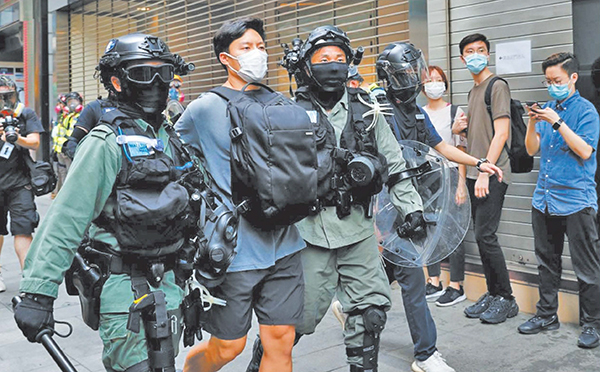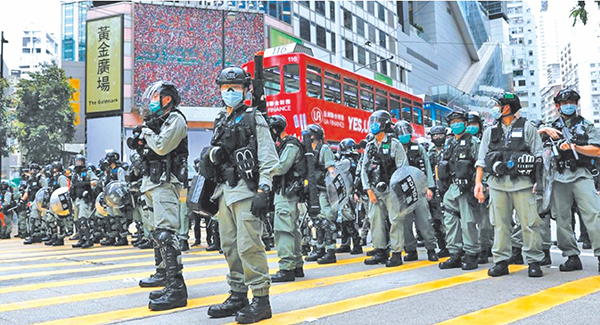
A Blow to Hong Kong’s Autonomy
China’s National People’s Congress (NPC), on 28 May, adopted a decision to make a national security law for Hong Kong to counter foreign interference and attempts to seek independence of the special administrative region.
The central government’s national security department will also set up an agency in Hong Kong to fulfill its job, while Hong Kong shall also establish a special body and enforcement system to safeguard national security, according to the decision of the NPC.
The document also reiterates China’s “unswerving” principles of “One Country, Two Systems” in Hong Kong, meaning the city can still enjoy a different political system from that of the Chinese mainland.
The draft decision was submitted to the NPC after violent protests wreaked havoc in Hong Kong, threatening national sovereignty, security and development interests, the Chinese central government said.
Wang Chen, vice chairman of the Standing Committee of the NPC, said the draft decision aims to fix the loopholes in Hong Kong’s legislation as the city, after nearly 23 years since its return to the motherland, has not yet fulfilled its legal responsibility of enacting laws on its own to safeguard national security in accordance with Article 23 of the Basic Law.
Article 23 states that the Hong Kong Special Administrative Region (HKSAR) “shall enact laws on its own to prohibit any act of treason, secession, sedition, subversion against the Central People’s Government, or theft of state secrets, to prohibit foreign political organizations or bodies from conducting political activities in the region, and to prohibit political organizations or bodies of the region from establishing ties with foreign political organizations or bodies.”
Background
Article 18 of Hong Kong’s Basic Law, the territory’s de facto mini-constitution that came into effect after the British handover in 1997 specifically limited Beijing from applying national laws to the territory, except in matters of defence and foreign importance. These rights and laws have protected the territory from Beijing’s despotism since 1997 by guaranteeing Hong Kong an independent judiciary and certain civic freedoms that are not awarded in mainland China, while still being a part of China. The NPC decision changed all that. It not only sanctions the standing committee to draft such a law, it allows the law to be inserted into Hong Kong’s Basic Law by promulgation. The city’s more than 7 million residents saw it as a death knell to the “one country, two systems” model.
Articles 3 and 4 of the draft decision also specifically reiterate the HKSAR’s obligation to enact its own national security law. Hong Kongers, thus, face the dubious prospect of being under the scrutiny of not one but two national security laws. Carrie Lam, the Hong Kong Chief Executive, robustly defended the controversial national security law planned by China.
Successive governments in Hong Kong had previously attempted to enact a national security law as per Beijing’s wish, but with little success. Last year too, Hong Kong saw protests against an extradition law that eventually snowballed into an anti-china demonstration and a larger mass movement for pro-democracy reform. Unnerved by the massive anti-China sentiment on display during the protests last year, Beijing did not want to take any chances. Hence, the possible decision to enact the law for Hong Kong.
What is the Law About
The new law would criminalize any act of:
• Secession – breaking away from the country.
• Subversion – undermining the power or authority of the central governing body.
• Terrorism – using violence or intimidation against people.
• Foreign interference – activities by foreign powers/forces to interfere in Hong Kong and influence what is going on in the country.
Outrage in Hong Kong
On chat apps and internet threads used by Hong Kong’s pro-democracy movement, there were calls to resume the protests, which had largely been subdued in recent months on account of pandemic restrictions.

The mood among young Hong Kongers, who largely do not identify as Chinese, was grim: The slogan laamcaau – loosely translated as “If we burn, you burn with us”— has become popular. So, too, have calls for unequivocal, outright independence, which were rare before the authorities’ brutal response to last year’s protests.
Prominent democracy activists such as Joshua Wong said China’s message to protesters seeking to maintain their civic freedoms was clear. “Beijing is attempting to silence Hong Kongers’ critical voices with fear and force,” Wong wrote on Twitter, while expressing defiance.
US & British Response
After its muted response last year, the UK Home Office widened the pool of Hong Kong citizens who would be eligible to apply for UK citizenship, in effect implying that millions may be able to apply if China pressed ahead with the security legislation. UK home secretary Priti Patel said the UK would continue to defend the rights and freedoms of the people of Hong Kong. UK foreign secretary Dominic Raab said his government would open a path to citizenship for 300,000 Hong Kong residents with British National (Overseas) passports, if Beijing did not roll back its decision.
US President Donald Trump said the administration would begin eliminating the “full range” of agreements that had given Hong Kong a special status in its relationship with the US that mainland China lacked, including exemptions from controls on certain exports. US secretary of state Mike Pompeo said the US held out hope the Chinese Communist party would reverse its push for greater control over Hong Kong and move back in line with its international commitments.
Comments
The people of Hong Kong were fearful that the law would likely lead to a crackdown on free speech, widespread arrests on spurious political charges, and the unleashing of China’s security organs, such as the People’s Armed Police and the Ministry of State Security.
The NPC’s decision also states that bodies such as the Ministry of State Security will be allowed to operate in Hong Kong – which could mean spying on schools, universities, the media and monitoring people’s personal social media accounts for any sign of dissent.
The irony of the security law has not been lost on the world. In their own struggle for power before 1949 that was exactly how Chinese communists used Hong Kong. Since then they have been concerned that their enemies would also use the territory in a similar way, as a “base for subversion” to overthrow the communist regime. It is no wonder, then, that given the domestic and international challenges to President Xi Jinping’s authoritarian regime, China sees the Hong Kong protests through a lens of paranoia about the rest of the world.
For businesses, the main value of the city has been its financial and legal systems, which are more transparent and fair than the mainland’s, making it an attractive option for both foreign and Chinese firms looking to prove their credibility in the region. The curbing of freedom of speech and erosion of the rule of law endangers that.
The possibility that the new national security resolution may violate the International Covenant on Civil and Political Rights can no longer be relied upon to check China’s intentions. As its dismissal of the Joint Sino-British Declaration has indicated, China feels emboldened to disregard laws it sees as at odds with its national interests. On Hong Kong and elsewhere, Beijing is prepared to challenge the rules-based international order.

















